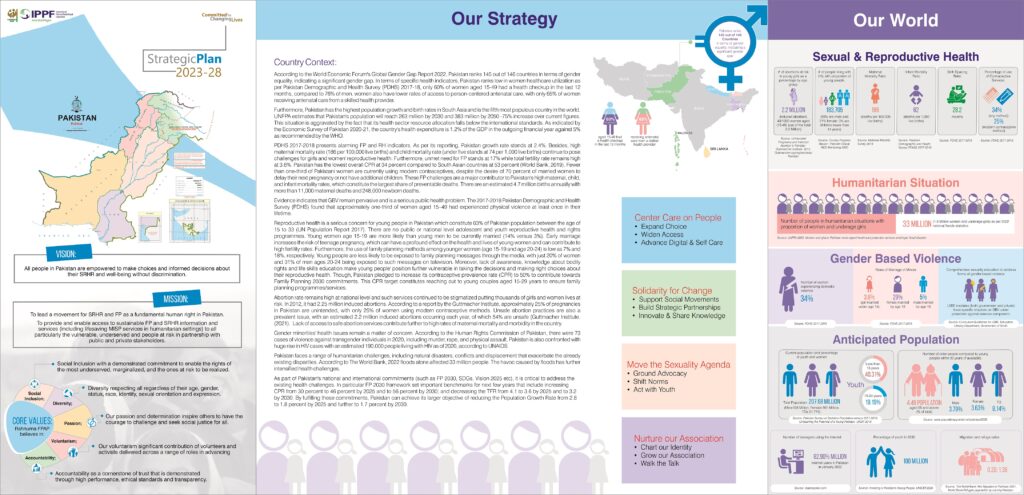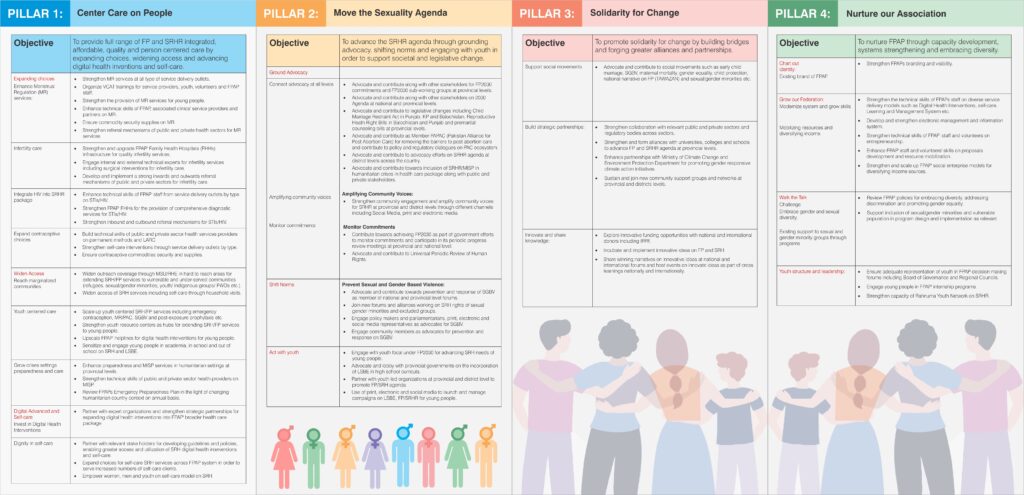Introduction
Rahnuma Family Planning Association of Pakistan (R-FPAP) stands as one of the largest and oldest rights-based civil society organizations at the national level, dedicated to reproductive health (RH) and family planning (FP), renowned both nationally and internationally as a leading advocate and service provider in the RH sector. It has collaborated with major national and international development agencies, including INGOs, UN Systems, public sector entities, and government institutions. R-FPAP is committed to alleviating the sufferings of marginalized and vulnerable sections of society through integrated efforts in RH and FP.
R-FPAP is one of the largest NGO based health infrastructure across Pakistan. Our Head Office is in Lahore with five Regional offices throughout Pakistan. Furthermore, it has extensive service delivery network that comprises 98 static units including 9 Family Health Hospitals, 70 family health clinics, 15 associated clinics; 16 Family Health Model Clinics, 14 Mobile service units; 6 toll-free youth help lines, 43 youth resource centers, 544 Community Based Distributors and 1242 enrolled Private Practitioners (PPs). Through these channels, FPAP provides high quality, integrated FP and SRH information and services across Pakistan. It also has substantial experience and strength in working in humanitarian settings across Pakistan.
The Government of Pakistan acknowledges R-FPAP’s contributions through its quarterly performance reports issued by the Pakistan Bureau of Statistics under the Planning Division (www.PBS.gov.pak).
To address new challenges in the population sector, such as the National Devolution of 2011 and the adoption of the Sustainable Development Goals (SDGs) 2016-2030 and FP 2030 Commitments, R-FPAP revised its Strategic Plan for 2023-28. This plan envisions a future where “all people in Pakistan are empowered to make choices about their SRH and wellbeing in a world without discrimination.” The mission has been redefined to lead a movement for SRHR and FP as basic human rights in Pakistan and to provide sustainable and quality SH and RH, including FP information and services, particularly to the vulnerable and underserved, in partnership with the government and other stakeholders.
Governance and Management Structure
In 2022, R-FPAP’s new Board of Governance (BoG), consisting of 15 members in total : 10 internal members from the Regional Councils’ ordinary membership and 5 external members chosen for their services in the social sector (SRH), public service, legal field, and/or philanthropy. The Board includes at least five youth members under 25 at the time of selection and representatives from vulnerable and marginalized groups, such as people living openly with HIV, maintaining a 50% gender balance. The Chief Executive Officer serves as an ex-officio member/secretary without voting rights. The governance structure is complemented by professional management located in the Head Office and five Regional Offices (Punjab, Sindh, Federal/GB/AJK, KP, and Balochistan Regions), overseeing 15 Program Offices (PMOs) in Karachi, Badin, Lahore, Faisalabad, Chakwal, Muzaffargarh, Quetta, Turbat, Islamabad, Muzaffarabad, GB, Kohat, Peshawar, Mardan, and Haripur.
Collaboration with Public Sector
R-FPAP collaborates closely with the Ministry of National Health Services, Regulations, and Coordination (MNHSRC), Government of Pakistan, and serves as the CSO Focal for the Country Engagement Working Group (CEWG) on FP 2030 under MNHSRC. It is a member of the SDGs Task Force, the Prime Minister’s SC/CCI Task Force, and partners with the Federal Ministry of Economic Affairs, Ministry of Planning, Development and Reforms, National Institute of Population Studies (NIPS), Health services academy (HSA) and Population Association of Pakistan (PAP). Internationally, it is part of the FP 2020 Champions Group.
Private Sector Engagement
To expand SRHR services and information, R-FPAP has enrolled 1242 registered private practitioners and 544 community-based distributors across the country, enhancing outreach and referral networks for quality SRHR services.
Alliances and Partnerships
R-FPAP maintains strong partnerships with provincial governments, signing various MOUs and agreements, and participating in numerous Provincial Health, Population, Youth, and Gender-related Task Forces and Committees. The organization collaborates with UN agencies, including UNDP, UNICEF, UNFPA, UN Women, UNAIDS, UNHCR,FCDO, DFAT,WRC, CDC, JSF and UNIFEM, enhancing its advocacy efforts. R-FPAP is also part of alliances such as the Pakistan Alliance for Post Abortion Care (PAPAC), the Alliance Against Child Marriage, and the LSBE Alliance. Additionally, it is involved in various UN Clusters and works closely with NDMA and PDMAs during disasters. R-FPAP engages Parliamentarians (Parliamentary Caucus) and Media (Media Network) to advance its legislative and advocacy agenda.
Structure of the organization is comprised of two major legs; governance and management. Governance of the organization vests in its volunteers. The democratic Governance structure is based on National Council, National Executive Committee, Regional Councils and Regional Coordinating Committees. This governance structure is complemented by professional management, which is located in five Regional Offices (Punjab, Sind, Federal/AJK/Gilgit Baltistan, KPK and Baluchistan Regions) Ten Program Offices (PMOs) fall under the jurisdiction of these Regional Offices. They are currently located in Badin, Faisalabad, Chakwal, Turbat, Azad Jaummu and Kashmir, Gilgit, Kohat, Muzzafargarh, Mardan and Haripur. At the Head Office level, the Chief Executive Officer leads the professional team. Management at the Head Office level has two tiers; that is, Directors, and Managers, supported by Program Officers and Program Associates. The total staff strength of the organization in 1,117.
Rahnuma-FPAP’s contribution to the government’s national level CYP achievement has been in the range of 10-7%. The organization’s Service Delivery network is comprised of 104 Static Units including 9 Family Health Hospitals and 3 KATO Development Complexes; 2356 Associated Clinics; 10 Mobile Service Units; 6 toll-free Youth Help Lines, 6 Youth Friendly Clinics and 52 Youth Resource Centers and 2468 Community Based Distributors (CBDs). Organization has also established a Regional Training Institute (RTI) at Lahore to provide trainings to its own service providers, staff and volunteers as well as to the staff and volunteers of the other stakeholders. At present FPA Pakistan is covering an area of 77910 sq. km. and population of 12,569,000 in all its areas of operations.
In the Public Sector, the organization has experience of working with Pakistan Army, Pakistan Air Force, City Government Lahore, Pakistan Railways, Government of AJK, Northern Areas Health Department, Cantonment Boards of POF, Wah and Heavy Rebuild Factory, Texila. To promote service delivery, organization also implements women empowerment and youth empowerment programs with the provision of micro credits in collaboration with Khushhali Bank.
In private sector organization has developed partnership to increase the coverage of SRHR services and information. Organization has engaged 2169 private practitioners, 1519 community based distributors and 949 traditional birth attendants all over the country in order to expand the outreach and strengthen referral networks for quality SRHR services. Organization is also working with 35 NGOs supporting them both in technical and financial terms. Ten of these NGOs have been equipped to a level where they are now self-sustained and providing services to the people independently.
Accountability, Financial Management and Transparency:
Rahnuma-FPAP keeps a separate account in a scheduled bank for each other donor’s projects. The transactions are made through bank transfers/cheques. A chartered firm with international affiliation audits the FPAP accounts. Their reports are presented to National Council meeting and fully discussed by its members. The audit reports are shared with donors and public through FPAP’s Annual Reports.
System of Internal Control has been established and its operations are being regularly reviewed. There are nine areas which have been approved for focusing in internal reviews such as
i) activities audit
ii) purchase
iii) vehicle running cost
iv) sustainability fund
v) travel and daily allowance
vi) physical verification of assets in all system
vii) legal cases
viii) suppliers evaluation and enlistment at all regions and
ix) reporting formats
Rahnuma-FPAP has two type of audit. One is statutory audit conducted at the end of the year which includes all the projects run in that particular year. This audit is conducted by internationally recognized audit firm. Other type of audit is project audit which is conducted as mentioned in the project plan.
Recent research conducted on the beneficiaries of Rahnuma-FFPAP indicates that (66%) of these belong to Poor Marginalized Socially Excluded and Underserved (PMSEU) group. Rahnuma-FPAP has a ‘No Refusal Policy’, whereby anyone who is unable to pay for the already subsidized service charges, is served after due diligence without or at subsidized rates. Rahnuma-FPAP has a strong Quality of Care project through which Quality Assurance doctors and other monitoring staff conduct supportive supervision of all service delivery points. Also, frequent exit interviews are conducted, to ensure quality of care and client satisfaction. Indeed, 48% of Rahnuma-FPAP clients are referred by clients who were satisfied with the services and 7% of clients are referred to R-FPAP by other service providers in the locality. Furthermore, community mobilization activities are a regular feature of R-FPAP program, whereby support groups, peer educators and partner defined quality methodologies are employed.
Research always provides a basis for initiation and implementation of effective and innovative programs and this strategy has been regularly used by the organization to measure the progress and direction of its programs. Since its inception in 1953, the FPAP has conducted 131 studies to evaluate the programs and even to find solutions to the existing problems related to family planning and reproductive health for new programs. These researches/studies are held in house and with support from outside consultants/agencies. Studies also included the KAP surveys as well.
- Pioneer of family planning movement in Pakistan
- Moved from family planning to Holistic Development Paradigm in 1994
- Providing SRHR/FP services to the people of Pakistan through a service delivery network of 104 Static Units including 9 Family Health Hospitals and 2 KATO Development Complexes; 2356 Associated Clinics; 10 Mobile Units; 6 Toll-Free Youth Help Lines, 6 Youth Friendly Clinics, 50 Youth Resource Centers, 1 VCT Center and 2 Drop-in-Centers (DICs)
- Rahnuma has developed an Allied Support Structure of 2468 Community Based Distributors (CBDs)
Established a Regional Training Institute (RTI) at Lahore with state of the art facilities for training
The FPAP’s work has always been recognized nationally and internationally and organization has received a number of awards such as:
- Global 500 Award of the Earth Summit 1992
- Common Wealth Youth Service Award 1996 for promotion of small family norm amongst the newly weds
- Common Wealth Award of Excellence 1997 for Girl Child Program
- Common Wealth Service Award UK to FPAP’s Community Institution Project Faisalabad for its holistic and integrated family planning and reproductive health approach at grassroots 1997
- Common Youth Services Award 1998 for Self-Employment Scheme for Youth and Service Delivery
- Performance Excellence Award by the Government of Pakistan (2009)
Rahnuma-FPAP Strategic Plan


